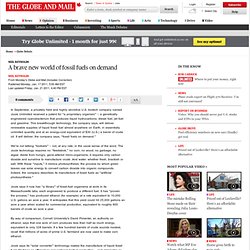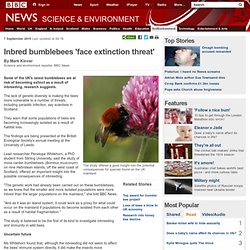

Evolution. Abelhas. The new residents of St Kilda archipelago. 29 August 2010Last updated at 00:27 By Steven McKenzie BBC Scotland Highlands and Islands reporter Generations of islanders survived on a diet mainly made up of seabirds and local produce.

Eighty years after it was evacuated, St Kilda is a temporary home to as many people as there were on the islands at the time they were abandoned. The last 36 St Kildans left on 29 August 1930 because life had become too difficult on the remote archipelago. But summer can see as many as 35 people living on the main island of Hirta. They are a mix of staff from owners National Trust for Scotland (NTS), Ministry of Defence workers, volunteers and scientists. A brave new world of fossil fuels on demand. In September, a privately held and highly secretive U.S. biotech company named Joule Unlimited received a patent for “a proprietary organism” – a genetically engineered cyanobacterium that produces liquid hydrocarbons: diesel fuel, jet fuel and gasoline.

This breakthrough technology, the company says, will deliver renewable supplies of liquid fossil fuel almost anywhere on Earth, in essentially unlimited quantity and at an energy-cost equivalent of $30 (U.S.) a barrel of crude oil. It will deliver, the company says, “fossil fuels on demand.” We’re not talking “biofuels” – not, at any rate, in the usual sense of the word. Inbred bumblebees 'face extinction threat' 7 September 2010Last updated at 00:19 By Mark Kinver Science and environment reporter, BBC News The study offered a good insight into the potential consequences for species found on the UK mainland Some of the UK's rarest bumblebees are at risk of becoming extinct as a result of inbreeding, research suggests.

The lack of genetic diversity is making the bees more vulnerable to a number of threats, including parasitic infection, say scientists in Scotland. They warn that some populations of bees are becoming increasingly isolated as a result of habitat loss.